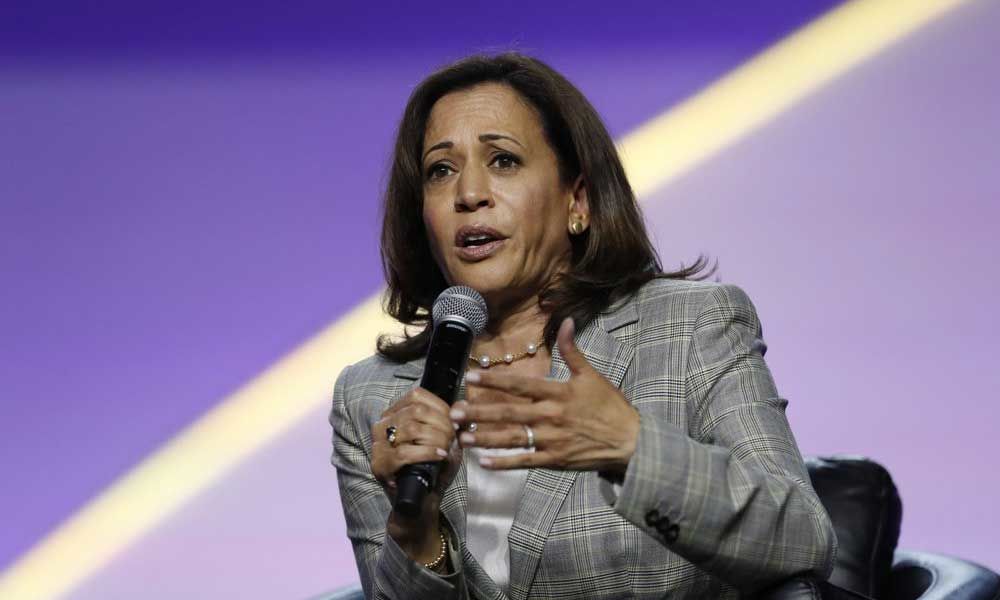Harris health plan stops short of overhaul Sanders envisions

WASHINGTON: Kamala Harris is filling in the details of how she would move 330 million Americans onto a single government health insurance system, her fullest statements on an issue that's getting top billing in the Democratic presidential primary.
The issue also has posed some problems for the California senator.
Harris is a supporter of Vermont Sen. Bernie Sanders' "Medicare for All" legislation, but the plan that she released on Monday stops short of the full-scale overhaul that Sanders has envisioned. While Harris would still replace the Affordable Care Act with a single-payer health plan for all Americans, she is splitting with Sanders on some of the key details.
Harris differs with the Vermont senator, a rival for the 2020 Democratic nomination, in slowing the transition to a single-payer system to 10 years instead of the four he has proposed. She still envisions a role for the private system — just as long as it takes its lead from the government. And Harris is, for the first time, addressing how she would pay for a sweeping health care overhaul that Sanders has estimated could cost as much as $40 trillion over one decade.
The debate over national health care policy has been one of the most animating features of the race for the Democratic presidential nomination. And for Harris, it has been one that has put on display the tension between her pragmatic inclinations and a desire to meet the demands of an energized progressive base seeking a liberal agenda to counter President Donald Trump.
In a Medium post published on Monday, she said her focus was on finding a way to lower health care costs.
"Right now, the American health care system is a patchwork of plans, providers and costs that have left people frustrated, powerless and insurance companies in charge," Harris said in the post. "And the bottom line is that health care just costs too much."
Harris has repeatedly been forced to clarify her stance on Medicare for All. During the first set of presidential debates she appeared to suggest that she supported abolishing private insurance, later clarifying that she does not. And prior to releasing her own health care plan, she was criticized for saying that she opposes a middle-class tax hike to pay for Medicare for All without making clear how she would pay for it.
Harris is releasing her plan days before Democrats meet in Detroit for the second set of presidential debates.
Though Harris' plan draws specific distinctions with Sanders, the chief architect of the Medicare for All plan, they will not appear on the same debate stage. But Sanders campaign has already been critical of her new plan.
Sanders campaign manager Faiz Shakir on Monday said that Harris was "continuing her gradual backdown from Medicare for All" and suggested that she had been inconsistent on the issue of health care.
Harris will appear on stage with former Vice President Joe Biden, the most high-profile candidate in the sprawling field to opposed Medicare for All in favor of a so-called "public option" that would allow people to decide between a government-financed plan or a private one.
Biden, with whom Harris memorably clashed during the first Democratic debates in Miami, has warned that a transition to a Medicare for All system could present coverage risks for Americans who defend on the Affordable Care Act.
Biden also has seized on Harris' recent comments, in an interview with CNN, that she opposes a middle-class tax hike to pay for Medicare for All. Biden said Harris was not being realistic about what it would take to pay for Medicare for All.
"You have a lot of people out there supporting that plan and are running and saying, 'But I'm not for that tax,'" Biden said recently in Las Vegas. "There's no way to pay for it."
Sanders has said as recently as this month that the sweeping overhaul of the U.S. health system he envisions could cost up to $40 trillion over a decade, and he has said that one option for paying for it would be a 4% tax hike on families making more than $29,000 each year.
Harris said that "hits the middle class too hard," and she is calling for exempting households making less than $100,000 each year from that 4% tax, with "a higher income threshold for middle-class families living in high-cost areas."
Sanders estimated that the tax increase he proposed would raise $3.5 trillion over 10 years. Harris did not specify how much revenue would be raised in the scenario she's proposing.
To pay for the difference, Harris wants to tax stock trades at 0.2% of the value of the transaction, 0.1% for bonds and 0.002% for derivatives.
Harris argues that by making the transition period from current policy to Medicare for All 10 years instead of four, the overall cost of Medicare for All will be lower than in Sanders' bill.


